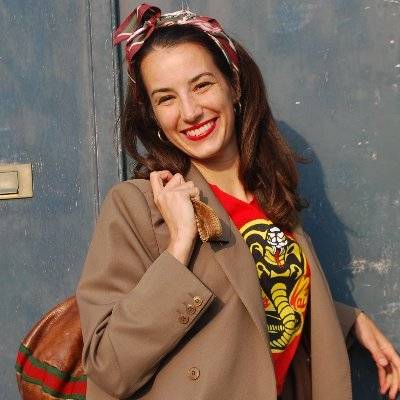Tripoli-born art entrepreneur and educator Shatha Sbeta is very clear about her objective. “I want to bring Libyan female artists and their artworks — as well as their stories — out to the world through commerce,” she tells me.
Sbeta is the founder of De-Orientalizing Art, the online gallery and social enterprise which was born in 2019 as a solution to the financial struggle that Libyan women artists face, with a strong Said-inspired philosophical underpinning. “It is known that one of the necessary conditions for women’s empowerment is financial independence,” she points out. “That is why I believe a commercial platform is a vital component for the philosophical, sociological and social change premises of De-Orientalizing Art.”
As a child in Tripoli, she didn’t experience an artistic environment growing up. “I did, however, enjoy art classes at school and realised many creative projects in the summer at home. But other than that, I wasn’t aware of the local art scene. I did not go to art galleries or art shows.”

De-Orientalizing Art – Faiza Ramandan, Orange Earrings, art prints
Before settling in California for her MA degree in International Studies at Claremont University, she lived in many different countries. A common trait that she encountered, from Canada to France, was ignorance about Libya and Libyans. “I think this has to do with the culture of silence that has been embedded in Libyan society. This has been seen as a virtue, following decades after decades of oppression, from colonialism to political tyranny.”
It was in France that Sbeta started exploring art a lot more closely, studying both art history and contemporary work. But even there she didn’t encounter anyone aware of the art scene in Libya. “Many confused me for a Lebanese and spoke to me about Lebanese art,” she chuckles.
As a Libyan woman living abroad, she started feeling a strong urge to reconstruct a sense of belonging for herself and people in the same situation. In 2012, when she was a first-year university student, she recalls questions about her background that stemmed from a lack of knowledge about Libya and often ended up sounding offensive. “I heard comments such as: ‘We did not know Libyan women act like this.’ And, ‘You look exotic.’ These comments always bothered me.”
Her perspective shifted completely when she came across Edward Said’s classic book Orientalism. “The book opened my eyes to issues I always noticed but could not understand. The systems of power dynamics between the ‘west and the east’, the entitled power of ‘othering’ everyone who looks different… it all started to make sense.”
READ: Yemen used to be, using art to bring a rich history back to life
Following her studies in Politics, Human Development and Social Relations, she decided to step in to change the perception of Libyan women in a way that wasn’t confrontational or that would create other layers of conflict, while at the same time creating economic incentives. “I thought of art, immediately, as a language that transcends complex thoughts and feelings; it would be the perfect medium for change-making.”
She was adamant about focussing solely on Libyan female artists, but at the same time, she didn’t want the platform to be perceived through an orientalist lens. The main challenge in the process, she notes, is to navigate the complex Libyan cultural context, while also being inviting and welcoming to art collectors.
“This is one of the biggest challenges: translating fans and supporters into buyers. I came to realise that storytelling is a great way to combat this. However, storytelling comes with its own issues and problems, especially as some artists are not willing to have public visibility.”
A strong incentive for buyers is knowing that at De-Orientalizing Art the artists make a two-thirds profit, something quite rare in the commercial art world. “De-Orientalizing Art has only been in business for one year and hence, we are still learning and experimenting. With Covid-19, the challenge to manage sociological change, as well as the profit gain, has been difficult due to our inability to take part in art fairs, festivals or other events.”
INTERVIEW: Najlaa Elageli and expanding the perception of contemporary Libyan art
The gallerist doesn’t think that the pandemic affected artists in Libya any more than artists in other countries, though. “Many were still able to participate in different art shows and events following the necessary procedures,” she explains. “The main problem is that, like everywhere else in the world, Libyan artists are mainly confronted with the fact that art is not a basic essential. This makes art marketing and buying, especially in times of global health and consequent financial crises, even more challenging.”
In the current scenario, it’s really the cultural message of deconstructing the orientalist framework that comes to the forefront. “What I aspire to achieve is that, whenever someone purchases an art piece, which has an inbuilt back story, it will ignite conversations among and between this person’s community,” concludes Shatha Sbeta.
Website: https://www.de-orientalizingart.org/

![Tripoli-born art entrepreneur and educator Shatha Sbeta [Middle East Monitor]](https://i0.wp.com/www.middleeastmonitor.com/wp-content/uploads/2021/03/intw-1.png?fit=920%2C613&ssl=1)










